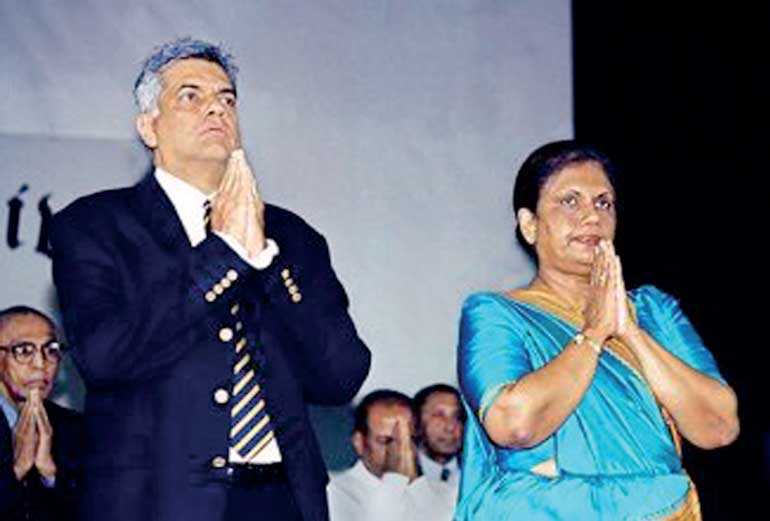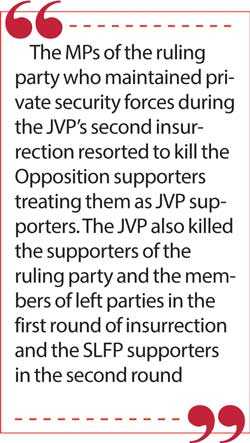Monday Feb 23, 2026
Monday Feb 23, 2026
Friday, 27 December 2019 00:30 - - {{hitsCtrl.values.hits}}

Revenge from opponents can be considered a tribal legacy that we have inherited. It is a deeply ingrained characteristic in Sri Lankan political culture. This shows that the Sri Lankan society has become democratised only superficially and not from the inner spirit of democracy.
Though Sri Lanka is a country that had been holding elections regularly, it cannot be considered a country having a deep understanding of democratic values, concepts and principles. There was never a popular liberal movement among the people in Sri Lanka.
Also, there were no liberal personalities among the political leaders of Sri Lanka. None of our early leaders like Ponnambalam Arunachalam, E.W. Perera and D.B. Jayatilleke can be regarded as political leaders endowed with theoretical knowledge and understanding of liberalism.
The Donoughmore Commission Report which appeared in 1932 carries an interesting analysis of the character of patriotism that prevailed in Sri Lanka.
According to this report, patriotism in Sri Lanka was not founded on a deep sense of a country based loyalty that integrated all community groups, but a narrow sentiment overwhelmed by communal tensions caused by ethnic, caste and religious differences. More than 90 years have elapsed since Donoughmore Commission’s report was released, but the character of patriotism is not different from what it was.
Tribal politics
Revenge from opponents can be seen as an ugly and anti-democratic characteristic of Sri Lankan politics since independence. When the ruling power changes, the winner invariably tends to take revenge not only from the opposition leaders but also from their supporters.
The political leaders of the country are more concerned with the welfare of their own group rather than the common good of the country. It is only the wrongdoings of the opposition party that the followers treat as offences and not the wrongdoings of their leaders.
They do not see the mistakes of their leader or leaders as an offence. As is customary, every Government that comes to power maintains a generous system of compensating their followers who had been victimised by the previous Government. If the amount spent by the State of Sri Lanka on compensation alone is accounted for, it will certainly amount to a huge sum of money.
The political parties in Sri Lanka have a family background; there are families or family groups that claim for the ownership of political parties. The ownership of the UNP still lies with one family group. The ownership of the SLFP too remained with one family. Now the ownership of the PA also lies with one family.
The candidates contesting elections are chosen by the owner of the party and not by the party organisations. All parties run on black money.The supporters of political parties do not know the amount of money the party receives or how they are spent.
The culture of revenge
First Sri Lanka Prime Minister D.S. Senanayake hurriedly deprived the right to vote of the Indian plantation workers in upcountry because they opted to vote for the LSSP in electorates which were not contested by their candidates and also the Tamil representatives elected to the Parliament adopted a policy of not supporting D.S. Senanayake when he was struggling to form a Government.
In 1956, Bandaranaike had to deprive the Tamils of their language rights because he was compelled to please the factions of Sinhala Buddhists who elected him to power. President Jayewardene can be regarded as a political leader who had carried the practice of revenge from his opponents to a maximum level.
At the election meetings in ‘77, he said he would grant leave for Police for one week after he came to power. He made this statement to please the UNP supporters who had been severely harassed by the United Front Government headed by Sirimavo Bandaranaike, and to give his supporters an opportunity to reap revenge from their opponents.
After the election victory, as promised, the UNP followers were given the opportunity to take revenge on their political opponents. According to Police reports, the number of houses destroyed by setting fire remained close to a thousand. 
The procession did not stop there. President Jayewardene, having won a five-sixth majority in Parliament deprived the Opposition Leader of her civic rights so that she couldn’t contest the next Presidential Election. The Janatha Vimukthi Peramuna (JVP) of Wijeweera also played an important role in the program initiated by the Government to deprive her civic rights.
The MPs of the ruling party who maintained private security forces during the JVP’s second insurrection resorted to kill the Opposition supporters treating them as JVP supporters. The JVP also killed the supporters of the ruling party and the members of left parties in the first round of insurrection and the SLFP supporters in the second round.
A change in the culture of revenge
The regime of Chandrika ushered in ‘94 following the end of 17-year rule of UNP, can be described as an interim chapter of significant change in the culture of revenge. I had an influence, to some extent, on this change while there were several other strategic reasons for it.
I was the head of the committee in charge of the People’s Alliance (PA) propaganda campaign of ‘94 election. Despite various arguments, I was able to get the committee to agree to maintain a tradition of not resorting to vituperative politics in the propaganda campaign.
Consequently, on the day on which all propaganda work should be stopped, a prominent two-page press notice requesting the supporters of the PA to refrain from harassing the Opposition supporters’ upon the victory of election was prepared to be published in all mainstream newspapers on the day of the election.
We appealed to the PA supporters to abstain from harming anyone both physically and verbally. It was not something planned at the request of Chandrika. But she gave her consent to publish the message.
Victory of Chandrika appeared likely, but with a very close contest. However, the power to decide on the Prime Minister rested with President Wijetunga. Although Chandrika was the main star of the PA she was not the party leader.
The party leader was her mother. If for some reason, the President decides to appoint her mother as the Prime Minister, there was no action that Chandrika could have taken. Under the circumstances, a strategic plan was launched at the last minute to prevent the arising of such a situation.
Chandrika rushed to meet former President J.R. Jayawardene, who was in retirement. She explained to him that in the event her mother is appointed the Prime Minister, it is likely that she may resort to revenge from the leaders of UNP including J.R. Jayawardena and requested him to point out to President Wijetunga the need to appoint her as the Prime Minister to prevent arising of such a situation. JR spoke to President Wijetunga and explained the matter to him. Thereafter, Chandrika met President Wijetunga at his request.
While election results were being released, Gamini Dissanayake was busy engaged in an attempt to lure a few MPs to his side to form a Government. It was to defeat the attempt of Gamini Dissanayake that Ranil Wickremesinghe resigned from the post of Prime Minister and left the Temple Trees. Apparently Ranil had taken this decision in accordance with an agreement he had reached with Chandrika.
Creation of a system to protect one another
Whatever may be the reason, during this difficult time, former President J.R. Jayawardene, President D.B. Wijetunga and Prime Minister Ranil Wickremesinghe supported Chandrika.Therefore, it can be said that a new element was added to the political culture of the country after she had gained power.
The silent agreement reached between the leaders of the two main parties not to dig into the issues of corruption after gaining power despite serious accusations of corruption made against the Government during the election campaign while being in Opposition can be considered a new element added to the political culture.
Therefore, despite repeated demands from her supporters, President Kumaratunga refrained from probing into corruption and frauds of the 17-year rule of the UNP. Ranil Wickremesinghe too, who became the Prime Minister after gaining parliamentary power during Chandrika’s presidency, abstained from investigating fraud and corruption of Chandrika’s regime despite the pressure mounted on him by his supporters.
The Government of President Mahinda Rajapaksa that came to power afterwards also did not take action against corruption and frauds occurred during her regime notwithstanding the disputes Mahinda Rajapaksa had with her.
Similarly, Mahinda Rajapaksa did not take action to probe into corruption and fraud occurred during the rule of Ranil Wickremesinghe. By then, the traditions of the game had evolved in such a way that the ruling party gains the right to amass maximum wealth by undue means during its rule. The Opposition had the right to shout about it, but there was an implicit agreement between the two parties not to probe into the wrong doings of the predecessors, after coming to power.
I wish to cite two strong evidence to prove the existence of such a practice.
One is that during the regime of President Chandrika, a three-member Presidential Commission was appointed to investigate and report on the Batalanda torture chamber. Upon the publication of the report, I was informed by one of its commissioners that the printed report did not include an important chapter of the report of the Commission. I’ve already written about it. If that is true, it should have been done for the protection of Ranil Wickremesinghe.
The second incident is as follows: when Ranil Wickremesinghe was the Prime Minister, he intervened in an issue of decisive importance to protect President Chandrika. A person who knew the details of private Safe Lockers maintained by politicians in banks sneaked out secret information about three persons to Prime Minister Ranil Wickremesinghe, one at a time.
Somehow or another he had come to know the details of the banks in which the Safe Lockers were maintained and the value of the money kept in them. He did it for the common good and not for personal gains.
The law was imposed strictly in respect of the first and the second information. The third information was about the Safe Locker maintained by Chandrika. But, in this instance, Prime Minister Ranil Wickremesinghe did not apply the policy that he implemented in regard to the first two cases. ‘Chaura Rajina’ (Queen of Deceit), a book authored by me carries an account of this incident.
In 2015, President Mahinda Rajapaksa called Ranil Wickremesinghe and resigned from his position before the election result was officially announced. Probably he may have done it after having got an assurance from Ranil Wickremesinghe that the tradition maintained upto that date will continue in his favour.
Stupid policy of Yahapalana regime
The Yahapalana regime of 2015, created an atmosphere for retaliation by resorting to a witch hunt targeting only the regime of Mahinda Rajapaksa, instead of adopting a formal and objective approach, acceptable to all the people, to make an overall change in the corrupt system that prevails in the country.
Whatever the scale of corruption, it was not a thing that originated abruptly in the Rajapaksa regime. It was an ugly feature of all regimes and was operating in a rampant scale during the previous regime of Chandrika and the 17-year rule of the UNP.
Most of the senior politicians who joined the campaign to defeat Mahinda Rajapaksa had a corrupt history. Their intention was not to make Sri Lanka, a prosperous country, but to seize power and gain an opportunity once again, to amass wealth by unlawful means. A government that works against corruption should be free from corruption. Also, it should be seen to be so by the people. But the Yahapalana regime cannot be regarded as an entity which had a genuine intention for that.
When the investigations into corruption were confined only to Mahinda Rajapaksa regime, invariably his supporters tend to perceive it as a witch-hunt for revenge. In 2015, Mahinda was defeated in a very close contest, not by a massive majority as happened in the case of the defeat of the Government of Sirimavo Bandaranaike in 1977.
In Sinhala areas it was the loser not the winner who had much acceptance of the people. The Yahapalana regime should have taken this fact also seriously into consideration.
On the other hand, corruption is not a thing confined to politicians alone. It can be considered a malignant cancer that has plagued the entire society, including the bureaucracy. In such an environment, a program of corruption investigation should be implemented in a systematic manner acceptable to the public and after careful consideration.
If the corruption investigation program had been aimed at investigating corruption of all times without limiting it only to the Rajapaksa regime and hurting anyone unjustly, it would have been accepted by all the people as a fair and reasonable program.If for some reason, had there been a difficulty to bring such a program into the fore, then the Government could have introduced reforms to prevent corruption.
The assets and liabilities Law could have been regulated. It could have prevented the MPs doing business with the Government contrary to the law and punished those who had committed this offence by depriving them of their parliamentary seats. The Bribery and Corruption Commission could have been reformed following the examples of Corruption Investigation Commissions in Hong Kong or Singapore.
In spite of the availability of such measures, the Yahapalana regime opted to choose only the informal and ad hoc paths leading to chaos. This approach eventually resulted in the Mahinda Rajapaksa party being compelled to fight for its protection. The end result of this process had been the defeat of the Yahapalana regime and the restoration of the Rajapaksa rule.
Volte-face of the cycle
The process of revenge begun by the new Government can be considered a logical extension of the anti-Mahinda corruption investigation program implemented in a narrower sense by the Yahapalana regime. Criminal Investigation Department (CID) was the biggest victim of the damage caused by this stupid program of the Yahapalana Government. All the blame was put on the CID. This may cause severe damage to the judiciary also.
Not all politicians of Yahapalna regime can be regarded as honest and righteous people who had done no wrong. There may be people with ugly secrets hidden among them. The program of investigations initiated by the Yahapalna regime have uncovered some of the hidden secrets.
Similarly, the investigation process of the new Government might result in revealing more of such secretes. Investigation process of Yahapalana regime gave the public a chance to see one side of the coin. It would be possible for the public to see the other side of the coin with the investigative actions of the new Government.
Champika Ranawaka has become a victim of a major political witch hunt creating a sensational topic among the people. I am considered to be the one who saved his life. Perhaps, the new Government may have considered him more important than anyone else because he is the leader with the highest potential to grab the Sinhala Buddhist flag which is now in the hands of the new Government.
He was the one who planted the ideology of liberation of Sinhala Buddhists on the ground when it was confined only to a level of an abstract concept. He was the one who brought the Bhikkus back to the political scene after the tragedy of 1956.
The experience and hardships he is facing now may be oppressive and stressful. But, as a person with the highest potential to become a great leader in the future, it is good that he is subjected to an intense scrutiny. If he does not have secrets to hide, he will become a shining leader through this test.
Otherwise he too, will be thrown into the waste bin of history with all the other outdated leaders. A policy of retaliation and revenge may inspire the supporters of the victorious party. But, it won’t be the solution to the enormous crisis Sri Lanka is facing.
The captain of a ship may be able to handle minor flaws in the ship, alone. But when the ship’s bottom is pierced and the ship is filled with water and is about to sink, the captain cannot overcome the challenge alone. For that, he has to get the maximum support not only of the crew but also the passengers traveling on board.